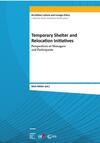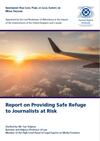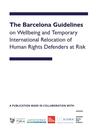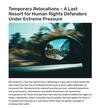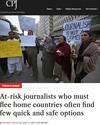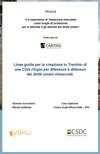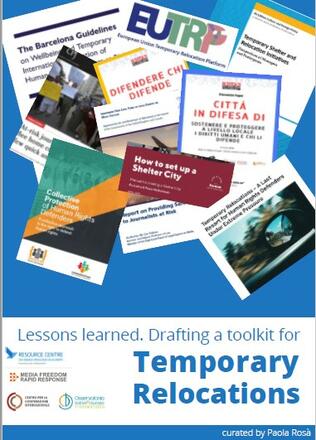
Definitions
Based on interviews with managers, consultants, and beneficiaries of Journalists-in-Residence programmes located in different countries (JiR Leipzig of ECPMF, JiR Milan of QCodeMag-OCBT, CCI for Elisabeth-Selbert-Initiative/ifa in Padua and Trento, Protect Defenders), and on available literature, this manual looks at journalists as human rights defenders, therefore applying the same principles, conditions, and recommendations, to both categories.
This toolkit draft is meant to integrate and complete available resources and literature.
Temporary relocation initiatives offer human rights defenders the opportunity to take a break and recharge while in a safe space (How to set up a Shelter City, Justice & Peace Netherlands)
Most human rights defenders turn to temporary relocation as a last resort when all other measures have been exhausted (Civil Rights Defenders, Emergency Fund)
Temporary International Relocation Initiatives (TIRIs) are an expression of international solidarity within the human rights movement (Temporary Shelter and Relocation Initiatives. Perspectives of Managers and Participants, ifa)
Temporary safe havens give journalists the possibility to return home and continue their work (Committee to Protect Journalists)
Journalists get the chance to rest and recuperate in a safe and discreet place, and also to continue their investigative work at their own pace and use their time in Leipzig for networking and finding solidarity (Journalists-in-Residence ECPMF)
The main task after return is to make sure that human rights defenders have arrived safely, and that they have reintegrated into their community safely (How to set up a Shelter City)
Temporary relocations are... temporary.
They are not part of a migration strategy.
Their aim is not to offer the journalist a new homeland for the future.
Though they are "temporary", the support they provide is not limited to the period of staying.
"It is a way to support journalists to continue their work", Chiara Sighele, CCI/OBCT
A selection of resources
Temporary Shelter and Relocation Initiatives. Perspectives of Managers and Participants
Maik Müller for ifa (Institut für Auslandsbeziehungen e. V.), 2019, 112 pages
A comprehensive study based on a total of 51 interviews with managers of temporary relocation schemes (27), human rights defenders who have experience of relocation (16), and other stakeholders, including funders (8). Two workshops were organised to bring together managers and other stakeholders in temporary relocation in Berlin (November 2018) and Bangkok (December 2018).
How to set up a Shelter City. Manual for human rights defenders’ shelters
Justice & Peace Netherlands, 2022, 20 pages
This manual shares Justice & Peace’s experience in setting up a Shelter City in partnership with non-governmental organisations, national or local governments, universities, and other actors. It is a manual for potential partners looking to join Shelter City and set up a safe space for human rights defenders at risk in their city or country.
Report on Providing Safe Refuge to Journalists at Risk
International Bar Association Human Rights Institute, 2020, 99 pages
States need to act. Introducing a new emergency visa for journalists at risk and making the essential adjustments recommended in this Report to the existing framework of safe relocation will send a clear message back:
‘If you are at risk for what you write, we will protect you’.
Difendere chi difende. Forme e modelli di protezione delle difensore e difensori dei diritti umani
Stefano Filippini for the network In Difesa Di, 2021, 32 pages
An overview of temporary relocations programmes based on definitions, literature, policy statements and interviews with managers. A detailed description of aims and criteria is offered for every programme.
The Barcelona Guidelines on Wellbeing and Temporary International Relocation of HRDs at Risk
University of York, Justice & Peace, The New School, ICORN, Martin Roth Initiative, 2019, 16 pages
The Guidelines are based on the findings of a collaborative research project based on interviews with over 100 human rights defenders, relocation coordinators, wellbeing support providers, and other protection actors from all regions of the world. They are aspirational and articulate shared principles about a collective approach to wellbeing.
Temporary Relocations – A Last Resort for Human Rights Defenders Under Extreme Pressure
Civil Rights Defenders
“A temporary relocation is a form of relocation that allows human rights defenders to leave their home country or city for a short period of time in order to avoid high risks and threats that they are facing due to their human rights work”, says Zinaida Muradova, Protection Officer at Civil Rights Defenders.
At-risk journalists who must flee home countries often find few quick and safe options
Committee to Protect Journalists, 2021
Since the creation of CPJ’s Journalist Assistance program in 2001, the single most common request for support the team has received has been for emergency relocation. Journalists working in dangerous places often face no choice but to move themselves and their families in order to escape threats.
Città in difesa di. Sostenere e proteggere a livello locale i diritti umani e chi li difende
Selene Greco for the Network In Difesa Di, 2021
A discussion paper with an overview of different temporary relocation programmes in Italy and Europe, aiming at the participation of local authorities.
Recommendations and examples of good practices are included.
Le esperienze di TIRI come luoghi di protezione per le attiviste e gli attivisti dei diritti umani
Marzia Deflorian for Yaku, CSDC, 2021
Guidelines for the creation of shelter cities in Trentino,
a region in Italy with several candidates cities
to take part in the Italian network of shelter cities.
OBCT research
In the last few years, attention to temporary relocations as important tools to support journalists has increased among EU institutions and human rights organisations.
Several projects have been implemented and resources have been published, and all these new manuals and papers contribute to the analysis and understanding of needs and gaps, also offering a detailed overview of existing programmes, implemented strategies, suggested amendments, admitted mistakes and lessons learned.
Therefore, aiming at not repeating the basics nor the most recent findings of the literature listed and digested above, the scope of this toolkit is to integrate them with a practical approach, giving the word to our “managers and participants” (like in the ifa 112-page study), listening to doubts and demands, advancing suggestions, and highlighting problems heard both from candidates and beneficiaries.
We carefully examined most of the existing literature, and ran 6 interviews to integrate those findings.
Journalists as human rights defenders
This toolkit is focused on relocations addressed to journalists in EU Member States and Candidate Countries, and is meant to be an invitation to think of new measures and new tools to protect and support reporters within the borders of the European Union and in Candidate Countries.
This invitation is also a kind of response to the EU Commission's Recommendation on ensuring the protection, safety and empowerment of journalists and other media professionals in the European Union, which refers to “temporary relocations” in the paragraph Independent response and support mechanisms:
Member States, in cooperation with journalists’ representatives, should support establishing specialist services - rapid response mechanisms - providing legal advice, psychological support and shelters for journalists and other media professionals facing threats.
What is a shelter?
The notion of shelter (“or any other appropriate accommodation for journalists and other media professional who have become victims of crimes”, quoting from the EU Recommendation) is quite diverse, and varies from a police relocation of the endangered person (a secret place where the journalist under protection is hosted) to a hospitality structure meant to give temporary relief and promote sociality among beneficiaries. According to our shared definition, a temporary relocation for journalists is first of all a form of solidarity with journalists and human rights defenders under pressure; the relocation is just one form of many, and international relocation is a “last resort”. Time is quite an important issue in the definition of a temporary relocation: on the one hand, it is a temporary measure, meant to last for a limited time; on the other hand, the support offered extends beyond the duration of the residency, well before arrival and after departure.
Strengthening the critical mass
The residency offers a unique chance to raise awareness about several topics and lines of interventions: if the journalist is available to speak in public, these events can contribute to strengthening the critical mass supporting residencies in general. Besides, they can be a way to raise attention to the issue investigated by the threatened reporter. Both results can be achieved even if the journalist is not willing or able to intervene in public events. Out of safety reasons, these dissemination activities and publications can be postponed.
Agreeing on expectations
Defining the aims and the expectations of a project is fundamental, and though it seems obvious, if it is not done in advance and in full detailed transparency, it can lead to disappointment and discouragement. Expectations need to be flexible, can vary from beneficiary to beneficiary, can be defined and redefined on the way, can be re-agreed among the organisers and with the hosted journalist: it is important to know in advance that they are subject to external impacts too. Preventing disappointment and keeping flexibility is the recommended approach. Transparency is another key word.
One of the beneficiaries of the first edition of JiR Milan received online threats while she was hosted by the programme. This strongly impacted on her wellbeing, and also on the dissemination activities already planned
The importance of a network
Beside offering advice and exchanging knowledge, networks can help spreading the news: organisations reach out to potential beneficiaries, and candidates find the right response to their needs. EUTRP already provides this platform and is a pattern to be promoted and supported, also for its capacity building role, and the stronger impact towards governments, institutions, and local authorities. But a network is not limited to host organisations: it can include other NGOs, civil society organisations, universities, regional governments, cities, and EU agencies.
The main difficulty when the programme was first created was to reach out to candidates. We do appreciate the fact that we received references and recommended cases from other organisations. This exchange is also important in the vetting phase
How to prioritise cases
Writing a call and deciding eligibility criteria is the first step towards taking the final decision on the selection. The organisation needs to know what the threat is, and how to verify pressure and evaluate the impact of each single case. The definition and the perception of threat are different in nature. This difference has to be clearly tackled in the text of the call in order to avoid misunderstandings. How much value is given to perceived threats? How can one measure the impact of perceived pressure? Cases will be prioritised according to a gravity scale that needs to consider the issue of time too: when is it necessary to intervene? How can we assess the urgency of the case?
It is useful and necessary to have strong networks and contacts in the beneficiary's country of origin in order to be able to verify information given by them and other sources, and to be able to respond to possible smearing campaigns hitting the journalist
The challenge of a running call
Compared to the call with a deadline, the running call presents more challenges: instead of having to prioritise one candidate among many, the procedure demands a swift response, an emergency intervention, and requires a quick vetting procedure of the single case. Therefore, the whole mechanism needs to be prompt and reactive in order to welcome the beneficiary in a relatively short time.
When Protect Defenders supports a relocation project, the agreement will be signed between PD and the host organisation, not with the defender. They will be in charge of the whole relocation, of the logistics prior to arrival and of the follow-up and return plan
Comprehensive support
The relocation covers a wide range of activities, as it is meant to be a comprehensive form of support. In general, all temporary relocations are conceived like that. There are costs for travel and visa, for lodging and food, for training, psycho-social support, medical care, legal advice, capacity-building, even support to the family in the country of origin or to the family that arrived together with the beneficiary. Some financial support for the period after the relocation can be granted too, and follow-up can include advocacy activities and engagement in the country of origin of the beneficiary.
Solidarity, the closer the better?
International relocations can be very useful when the journalist has to escape a threat in their country of origin and seeks a period of rest far from everything that can remind them of the threat. National or regional relocations, on the other hand, provide a better response in terms of comfort, language knowledge and lack of cultural gaps, in terms of emotional sphere, proximity to home, climate, etc. Both options are to be examined case by case. The cultural gap always presents some challenges, and cultural mediators are the key figure in this context.
Tailored support
The needs of the hosted person are at the core of the project, and the assessment of these needs is not always easy and immediate. Moreover, needs can vary with time (if new threats arrive, if the psychological situation changes, if health or personal issues occur during the stay). The tailored support that was designed after the initial interview has to be re-designed and adjusted to the new needs. Therefore, there has to be dedicated staff to manage the programme, with a focal point for coordination, for networking, for a general overview.
Beside resources for the different experts and consultants, there must be resources for the coordination, as it is fundamental to keep the overview of the project
Lessons learned: mistakes admitted and understood
Building up on experiences, on exchange of knowledge and on lessons learned is a good practice considered necessary by managers and advisors of relocation programmes.
The main steps recommended are: keeping in touch with colleagues of other organisations, attending training courses on different topics, exchanging information about procedures, sharing contacts of officers at local and at border authorities, never taking anything for granted, sharing both doubts and fears, and assessing the sustainability of the project in terms of time, coordination needs, political engagement and impact.
Empathy vs. bureaucracy
These programmes are a mixture of formal procedures and human contact, and both need to proceed with equal strength, attention, precision and care. The dichotomy between empathy and bureaucracy can be exhausting and puts the project at risk if not tackled on time. Too much empathy with the beneficiary can have a negative impact, limiting judgement and the cold-blooded evaluation of the case, of the needs to be tackled, of the steps to be taken.
Empathy is sometimes overwhelming. Sometimes you fight with the rules and try the impossible to help someone, because you know their most intimate situation
The written agreement
Transparency is key in every step of the project, and after selecting the beneficiary a written agreement has to be signed. Even if some details seem obvious and might not even sound nice to the journalist under threat, this agreement has to be as detailed as possible: the more the details, the fewer the chances of misunderstanding and mistakes. This agreement has to cover very practical details such as housing, the costs covered, the expenses reimbursed, the rules of the house, the expectations of both parties.
Professionalism vs. volunteerism
Though the contribution of civil society and volunteers is extremely important, the approach of the organisation has to be professional in all stages of the relocation. The input of volunteers and external associations needs to be coordinated and managed with care, and limited to situations where there is the full agreement of the beneficiary. In this case, too, transparency and coordination are key. There must be a clear coordination and distinction between the host organisation and local groups: though human support is very important, the coordinators can not risk losing control of the situation. Unlike volunteers, the coordinator will not risk thinking “We are not doing enough”.
Because of some difficulties in the first weeks, the group of local volunteers had to concentrate their activities in a very few days, and in the end it was too much for the hosts: they were tired, they asked us if they could refuse participating, and were afraid of offending the volunteers
One for all vs. one for each
There are two different approaches in organising support: either one person follows one case through all steps and activities, or a team splits responsibilities and tasks. While the former can be overwhelming for the worker involved, the latter seems to offer more chances for growth for the whole team and organisation.
Splitting responsibilities also allows for a stronger response in cases of emergency or misunderstanding. Training is extremely important, there must be resources for attending workshops with experts and courses on legal and procedural issues.
We have a therapist, a lawyer, a communication expert, but in the end I am the only one who follows the beneficiary since the application stage. I am the one who accompanies them to the doctor, to the bank, to the post office. Maybe a separation of tasks would help, yes... because sometimes it is heavy
Support to continuation
The main aim of a relocation project is to support the journalist to continue their job, either by offering time off, or integrating the residency with training and professional development opportunities. These can also include networking opportunities: the journalist is offered the chance to participate in public events, of collaborating with media outlets, of meeting colleagues from the place where they are hosted or from their country of origin. The exchange has to be clearly defined, in writing if necessary, and is always subject to changes and amendments.
Housing
Housing is a key issue for relocation programmes. In some cases, it absorbs most of the economic resources. A pleasant and welcoming place is very important, and there might be safety issues to be considered. Yet, there might be misunderstandings and problems, for example depending on the cultural gap or on the personal psychological situation of the beneficiary. Signing a detailed agreement is of extreme importance according to all our interviewees. Details included: where to buy or order food, cooking, use of appliances, care of furniture, recycling waste, cleaning, shared tasks in a co-housing, times of silence. The selection of the location is also going to have an impact on the residency: the need for a balance between independence and social life is a very important factor to avoid the risk of isolation.
Safety assessment
Safety in communications is the first issue that needs to be tackled. It seems that its importance is still underestimated. There must be attention in dealing with personal data, in choosing the appropriate communication system and platform. A safety consultant/expert has to be consulted also for practical details concerning travel, daily activities, telephone calls, visits. Other safety measures have to be implemented upon arrival, during the stay, and after departure. Special attention has to be devoted to relocations where the diaspora community is involved: sometimes the journalist abroad has no intention to meet their fellow citizens, the situation can also be dangerous and create further risks.
Nothing can be overlooked. There has to be an agreed protocol and all people involved in the project have to be trained and prepared by a safety consultant
EU policy vs. national policies
The EU's outspoken support for temporary relocations for human rights defenders clashes with difficulties in obtaining visas from national authorities and embassies based in the country of origin of the beneficiary.
National authorities are focused on the migration risk, they seem not aware of relocation programmes, their aims and the fact that temporary shelters have nothing to do with a migration project.
While the practical solution consists in implementing personal relationships with the officers in charge of examining the visa application, and in maintaining these relationships through the years, the Committee to Protect Journalists issued some recommendations that include for example training of “embassy and consular staff on special emergency visas”, and setting up “protocols allowing for emergency visas for journalists to be processed in a second country”.
Solutions in this direction would include a dialogue with stakeholders, awareness raising campaigns aimed at showing the importance of this kind of visa, and increasing the participation of local authorities in accompanying and supporting the host organisation.
Trust is the key word in all phases. And it is important to report to authorities what happened to the person after the residency, this builds up trust for the next project
Sources
Interviewees
Chiara Sighele, General Director CCI Centro per la Cooperazione Internazionale, Trento
Christian Elia, QCode Mag
Luciana Peri, Protect Defenders
Alina Toropova, ECPMF
Roberta Zambelli, CCI
Nancy Porsia, journalist
International law and other resources
The United Nations Declaration on Human Rights Defenders
The Special Rapporteur on Human Rights Defenders , a UN mandate created in 2000
This mandate was created to promote the effective implementation of the UN Declaration on Human Rights Defenders in cooperation and dialogue with governments and other actors; to study developments and challenges on the right to promote and protect human rights and seek, receive and respond to information on the situation of human rights defenders; to recommend effective strategies to better protect human rights defenders and to integrate a gender perspective and pay particular attention to women human rights defenders.
Ensuring protection - EU Guidelines on Human Rights Defenders , 10.06.2009
These Guidelines contain practical suggestions to the attention of bodies, institutions and EU missions (embassies of EU member-States and European Commission Delegations) aiming to strengthen EU action in terms of support and protection of human rights defenders and their cause, in the framework of contacts with third countries and within multilateral arenas
World Report on the Situation of Human Rights Defenders , 20.12.2018
Michel Forst published a world report presenting the recent developments in 140 countries
Collective Protection of Human Rights Defenders. A collective approach to the right to defend human rights , by Protection International, 2018, 12 pages
The purpose of this publication is to contribute to a shift in current prevailing narratives on the protection of human rights defenders. For protection to be effective, sustainable and reach a greater number of human rights defenders, we shift towards a more collective mindset
Esempi e buone pratiche di "temporary relocation" di difensori/e dei diritti umani , by Rete In Difesa Di, 2017, 9 pages
One of the first overviews of legislation and practices around Europe (Spain, Ireland, Switzerland, The Netherlands)
Vademecum per i difensori e le difensore dei diritti umani , di Erika Mazzucato, by Centro di Ateneo per i Diritti Umani "Antonio Papisca", University of Padua
A toolkit, an overview, information, papers and legislation to better understand who human rights defenders are and how to protect their activity
Tags: Safety of journalists
This content is part of the Media Freedom Rapid Response (MFRR), a Europe-wide mechanism which tracks, monitors and responds to violations of press and media freedom in EU Member States and Candidate Countries. The project is co-funded by the European Commission.

